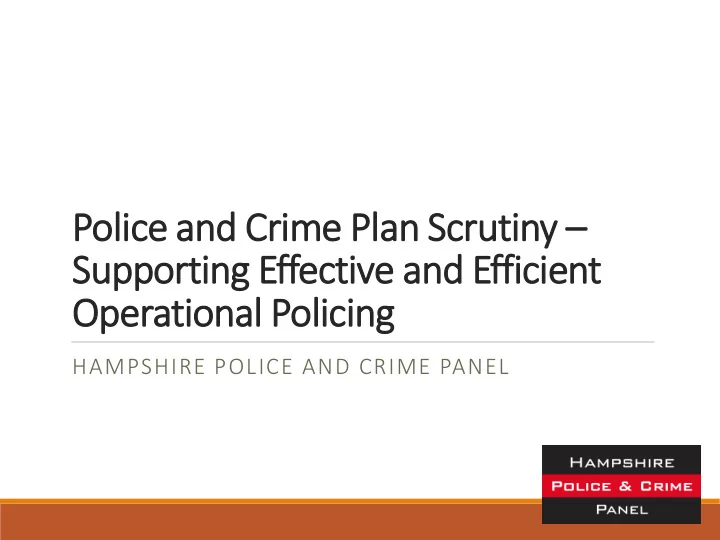

Police and Crime Plan Scrutiny – Supporting Effective and Efficient Operational Policing HAMPSHIRE POLICE AND CRIME PANEL
Scope of the Scrutiny Following public consultation, the Police and Crime Commissioner (PCC) launched his Police and Crime Plan in December 2016, within which he set out his key priorities for delivery to 2021. Within the Plan the Commissioner identified ‘Enabling effective and efficient operational policing’ as one of the four key pillars that would be given priority within his plan and support the delivery of his overall mission. During the Panel’s meeting in January 2018, to consider the PCC’s proposed precept, recommendations were made to the PCC, by the Police and Crime Panel (PCP), regarding the allocation of funds to operational policing. Additionally, the Panel noted a March 2018 survey by the Hampshire Police Federation reported that 98%* of those who responded did not have confidence in the Commissioner. Reflecting the priority the Commissioner has placed upon operationally efficient policing throughout his Plan, the Panel felt that this would be a timely and proactive opportunity to undertake a review of this topic. * 1,551 members responded, which represented 56% of the Hampshire Police Federation membership
Methodology • The Panel agreed and defined a scope for the scrutiny, outlining the key questions to be asked and identifying which organisations would be approached for evidence. Defining a • In defining the scope, the Panel appointed a Task and Finish Group to lead on this scrutiny Scope • The Panel wrote to witness organisations inviting them to share their views on the key questions asked by the Panel. • Views could be shared either through an online survey or in writing. Additionally a number of key organisations have been invited to meet with Members of the Task and Finish Group to share and discuss their views. Seeking • To date the Panel have approached 36 organisations for evidence with 13 making a contribution to the scrutiny and several further to do so before the end of July. Evidence • July 2019 Meeting – a summarised presentation to the Panel on the process followed and progress of the scrutiny to date Presentation • The Task and Finish Group will consider the evidence received and draw proposed findings of the scrutiny review and recommendations to the Commissioner, to be agreed by the full Panel at the October 2019 Meeting. Analysis • Once agreed by the Panel, the recommendations will be sent to the Commissioner for his consideration and response to the January 2020 meeting of the Panel. PCC’s response
Fin indings The evidence received to our review will be broadly grouped under the following headings: ➢ Enabling effective and efficient operational policing ➢ Commissioning and supporting areas beyond policing ➢ Strengthening Partnerships ➢ Engagement and Communication
The evidence already received has drawn many examples demonstrating how the PCC and his team have sought to deliver against Enabling this pledge through: effective and ➢ Respecting operational independence and holding the Chief Constable to account efficient ➢ Providing new technology operational policing ➢ Enhancing the Police Estate ➢ Supporting Police staff wellbeing ➢ Delivering funding for operational policing
Through funding and enhancing services and approaches in areas beyond policing the Commissioner and his team can have an impact on reducing policing demand and supporting the operational ability of the Commissioning force. Such areas include: and supporting ➢ Reducing re-offending areas beyond policing ➢ Supporting victims ➢ Youth engagement ➢ Out of court disposals and offender rehabilitation
One of the most important elements of the role of any PCC is to bring together partners to focus on reducing crime and policing demand, whilst promoting public safety. This is demonstrated through: Strengthening Partnerships ➢ Representation on key partnership meetings ➢ Creating partnership working opportunities ➢ Regional and national collaboration
Within his Police and Crime Plan the Commissioner outlined his first and overarching concern as “being visible, accessible and accountable to the people I represent ensuring their concerns are heard and addressed”. Engagement In order to achieve his strategic aim to and “Enable effective and efficient operational Communication policing” evidence has also been sought to understand how the PCC and his team are engaging key stakeholders and those organisations delivering and supporting operational policing.
Next Steps Following this meeting: ➢ June-July: We will continue to meet with the remaining organisations who have agreed to provide evidence to this review ➢ August-September: The task and finish group will consider the evidence received and draw proposed findings of the scrutiny review and recommendations to the Commissioner, to be agreed by the full Panel at the October Meeting. ➢ October: Once agreed by the Panel, the recommendations will be sent to the Commissioner for his consideration and response to the January 2020 meeting of the Panel.
Recommend
More recommend